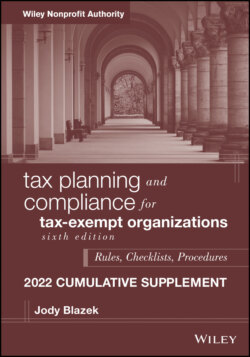Читать книгу Tax Planning and Compliance for Tax-Exempt Organizations - Jody Blazek - Страница 27
(b) IRS Delays in Tax Payment and Return Due Dates
ОглавлениеOn July 8, the IRS reminded taxpayers who took advantage of the People First Initiative tax relief and did not make previously-owed tax payments from March 25 to July 15 that they needed to restart their payments on July 15.3
The delay in income tax payment and filing included in the People First Initiative was followed up with delays in payroll tax withholding systems and payment. In response to the economic fallout of the COVID-19 pandemic on August 28, 2020, the IRS provided guidance to employers regarding an August 8 presidential executive order allowing employers to defer the withholding, deposit, and payment of certain payroll tax obligations (Notice 2020-65). The order also instructed the Secretary of the Treasury to explore avenues, including legislation, for eliminating the obligation to pay the deferred taxes.
On September 2, 2020, another presidential directive permitted the Social Security taxes of most federal employees to be delayed and not withheld from paychecks until 2021. The National Finance Center, which provides payroll services to over 600,000 federal employees, said at the time that it would defer the withholding and payment of the employees' share of Social Security taxes effective for the first pay period beginning after September 1, 2020.
Weather-related disasters also required special IRS declarations. The IRS announced that victims of the California wildfires in counties of California (and later Oregon and Washington) and the derecho storm in an Iowa county were designated as federal disaster areas qualified for individual assistance and additional time to make tax payments and file returns. Affected individuals and businesses had until December 15, 2020, to file returns and pay taxes that were due beginning October 15, 2020, including returns and payments due September 15, 2020, and quarterly payroll and excise tax returns normally due October 31, 2020.4
Lastly, the IRS encouraged taxpayers to adopt good tax recordkeeping systems and disaster preparedness. Taxpayers were reminded to create and maintain an emergency preparedness plan, including securing key documents and making copies and electronic backups of various financial statements and records, documenting valuables and content of homes, and updating emergency plans.5
Other tax compliance news prompted by COVID-19 included:
State guidance on whether COVID-19 telecommuters could create nexus was considered in some states for workers temporarily working in another state and their employers who did not reside in that state.
Security Summit warns tax professionals about new COVID-19 phishing scams, in the fourth installment of a series titled “Working Virtually: Protecting Tax Data at Home and at Work.” Scammers are zeroing in on opportunities presented by Economic Impact Payments and increased teleworking by practitioners.
The Tax Court made additional COVID-19-related procedural changes to accommodate remote operations during the COVID-19 pandemic plus additional procedural changes.
The IRS placed a temporary stop on mailing notices regarding balances due. “Although the IRS continues to make significant reductions in the backlog of unopened mail that developed while most IRS operations were closed due to COVID-19, this temporary adjustment to processing is intended to lessen any possible confusion that might be associated with delays in processing correspondence received from taxpayers,” the agency said. Such confusion might result among taxpayers who previously received a balance due notice and mailed a payment to IRS but the payment may still be unopened. In addition, the IRS said, the “unopened mail will be posted and credited on the date the IRS received them—rather than the date the agency opened and processed them.” Nevertheless, the IRS encouraged those who had received but not yet responded to a balance due notice to promptly respond.
On its website, the IRS posted frequently asked questions (FAQs) on the effect of COVID-19 on liens, levies, and other IRS collection activities.
Exempt organizations (EOs) that filed paper returns prior to 2019 were sent a reminder that, for tax years beginning after July 1, 2019, they were required to e-file their returns.
